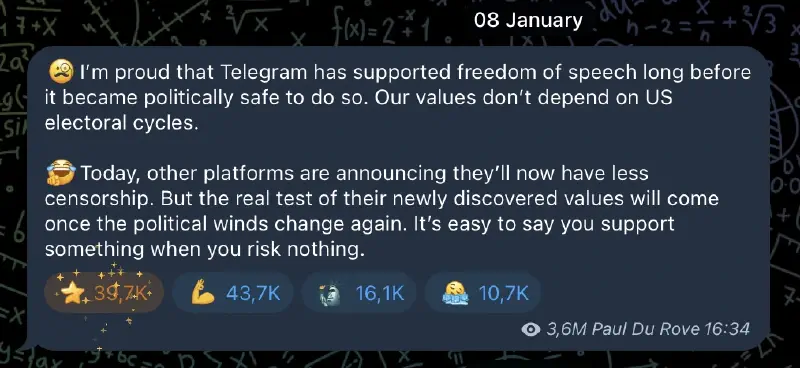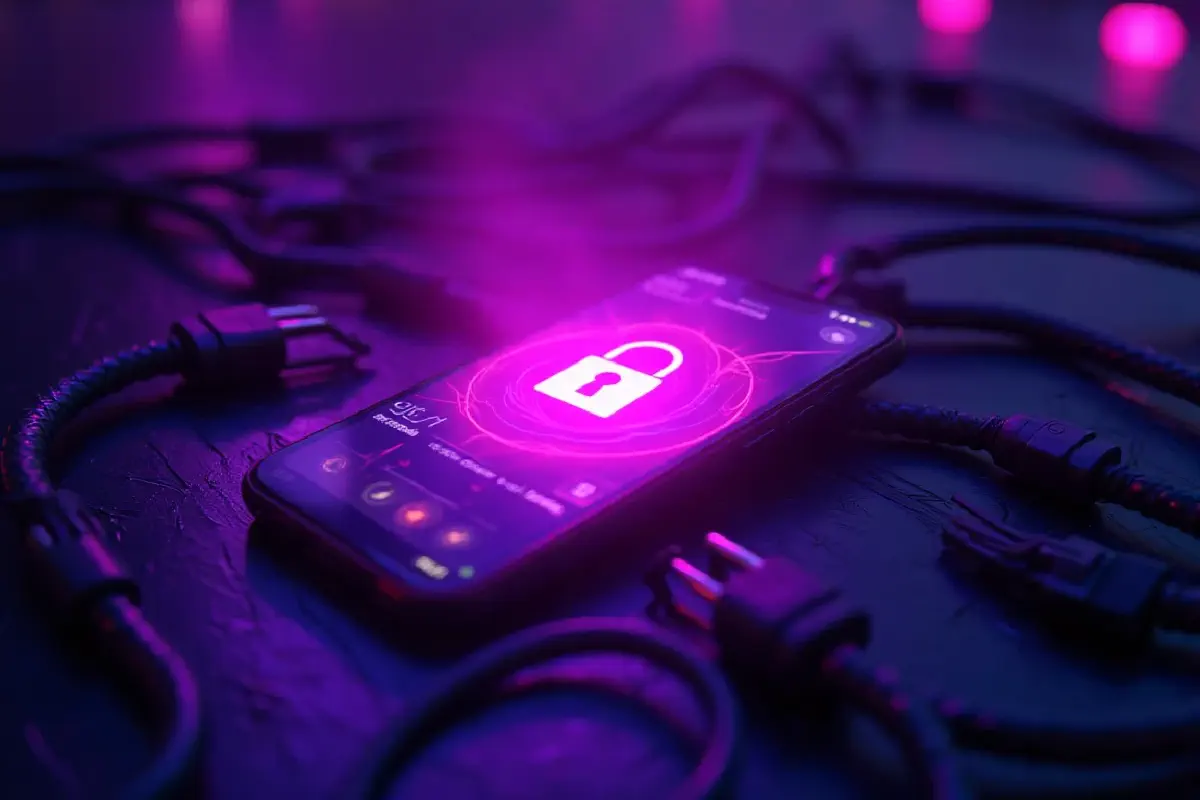We’ve all heard it before. Google, Facebook, Instagram, WhatsApp and Amazon track our every click and tap. They surveil our contact lists and map out our social connections. They read our every message and use this knowledge to increase their profits in any way they can.
In this article I will focus on how you can keep in touch with close friends and family in a safe and secure way, without giving away all your data to big tech billionares.
Some basics#
Early internet#
Early online communication was not encrypted at all. Email was created back in the 80s with all messages being sent in cleartext, open for everyone to read that wanted to listen in on the network. SMS was created in the 90s and all messages are still passed openly between teleoperators with no security or encryption, no guarantees at all about who is even the sender.
No one could have imagined that email would one day be the backbone for hundreds of services and daily communication. No one could have imagined that you would be chatting with your doctor online, getting verification codes over SMS or talking to your friends about intimate secrets on facebook.
End-to-end encryption#
Today the internet uses encryption in a lot of ways. When you visit almost every website your browser uses https which encrypts the website on the server before it is sent to you, so the content is kept secret from third parties. But anything you write on that website or app, be it Gmail or Instagram, can still be read by the company that runs the website or app.
End-to-end encryption means that only the sender and reciever of a message can read the content. Not even the company that created the app can read your messages. End-to-end encryption is the only method we have today to ensure real private digital communication.
Threat model#
Many people might think that they don’t need encrypted messaging because they are not criminals. But my main concern is not that a judge will try to read my messages, or that I have to escape an opressive government (so far). My main concern is that big tech companies analyse and read all mine and all my friends messages, and using this vast set of information, they compile personal interests into neat packages that they can send to advertising networks across the world.
You might be worried that your phone is listening to you, because after you talked about something over coffee with a friend, the next day you see an advertisment for this specific thing you talked about. But phones do not listen to you, this has been disproven many times, and the simple reason is that big tech like Facebook and Google does not have to listen, they already know so so much about you and your friends that they can target ads with incredible accuracy.
Metadata#
Facebook has recently decided that they will encrypt all conversations on Facebook messenger. Even though their main income is from ads, they have decided that they already know enough from plenty of other sources, that they don’t even need to see your messages anymore. Because they still see the metadata. They still see who is talking to who. They see from which network you are connecting, who your family and friends are. They still see what you search for on Google and what you discuss in Facebook groups.
So yes, WhatsApp and Facebook messenger are now end to end encrypted, but in my opinion this is a lure. They are trying to keep people using their products and build trust, so that they can continue to monitor our behaviour in other ways.
We need to break free from surveillance capitalism!
What messengers apps are there?#
Here is a quick comparison of the most popular messaging apps.
| Facebook Messenger | iMessage | Telegram | Signal | ||
|---|---|---|---|---|---|
| profit? | for profit company (Meta) | for profit company (Meta) | for profit company (Apple) | for profit company | non-profit foundation ⭐️ |
| based in? | US | US | US | UAE | US |
| users? | ~3 billion | ~3 billion | ~1 billion | ~1 billion | 200+ million |
| end-to-end encrypted? | encrypts your chats and calls | encrypts your chats and calls, but not groups | encrypts your chats, calls and profile | only “secret chats” encrypted | encrypts your chats, calls, profile and metadata ⭐️ |
| tracked? | tracks your profile, metadata and IP | tracks your profile, metadata and IP | tracks your metadata and IP | tracks your chats, calls, profile, metadata and IP | nothing tracked ⭐️ |
| open source? | closed | closed | closed | closed | open source ⭐️ |
| phone number? | number required | number or email required | number or email required | number required | number required |
| ads? | ad-free | so many ads | ad-free | ads in public channels | ad-free |
Facebook Messenger#
I used to love facebook. I loved having all friends in one space, it helped me learn names, joining events felt safe when I could see everyone else that would also go and I shared intimate fears and thoughts very publicly, using it almost like a dairy.
Then in 2014 news broke of how Facebook had experimented with peoples emotions by changing the algorithm on their news feed, and I quickly realised that no one should have that power. Then in 2018 the Cambridge Analytica scandal hit, where personal data from 87 million Facebook profiles was used in political campaigns.
Soon after I deleted my facebook profile and all that juicy personal data. Who knows if it is actually deleted, it might still be floating around out there somewhere in a stolen dataset. But at least I had done what I could.
WhatsApp#
Facebook bought WhatsApp in 2014, but the founders of WhatsApp left the company only a few years later, over disagreements of how Facebook wanted to collect and monetize peoples data. The founders then donated millions of dollars to Signal and helped start the Signal foundation, to follow their dream of giving real privacy to people. Something they could not do under Facebooks ownership.
Messages and calls on WhatsApp are encrypted yes, but the metadata and contact lists are not. Meta has full insight into every address book, who you message and when. They use this data to fuel their advertising business.
iMessage#
Apple launched the iPhone messaging service way back in 2011, and it was actually encrypted from the start. It automatically replaces SMS texting whenever two iPhones message each other, indicated by the famed blue bubbles. It is a huge success with billions of users, mostly because it so easily integrates into Apple life. But try to take any step outside Apple’s walled garden, and you will face problems. The iMessage protocol has never been opened up or standardised.
Android on the other hand has supported the open RCS standard since 2019, a modern replacement for SMS texting. Apple dragged their feet for many years, but finally added RCS support in iOS 18 released in 2024.
iMessage works great, but it’s usefullnes quickly stops the moment you want to include a friend with Android, which severely limits it’s use.
Telegram#
Telegram is an incredibly well designed app with slick animations and cute graphics. Unfortunately it’s reputation for being secure is a well constructed lie. Many people believe their communcation there to be safe, but it is not, Telegram can read everything. The only thing they encrypt properly are the so called “secret chats”, but even those cannot be proven to be safe, because all code is not open source.
They are currently monetizing their service, which means, you guessed it, they are serving ads. So far they don’t seem to be analysing chats to build advertising profiles of people, but since they have access to all messages, they could start any second, if they haven’t already.
Pavel Durov, the founder of Telegram, also has a great love for crypto-currency. In his Telegram channel he boasts about the enormous success “mini games” have on Telegram. All these so called “amazing” and “genius” mini-games either immidatedly try to get you to invite friends, or ask you to pay a small fee so that you can win big prices, or both. The game itself then looks cute, but in the end usually turns out to be a casino style slot machine with some type of made up currency, that you have to buy for real money.
To power all these mini-games, Telegram have created their own blockchain called TON, and allows other developers to launch their own crypto coins within telegram. To be honest at this point I stopped reading and just decided that this whole thing smells so bad of crypto scam that I can’t be bothered to read on. But if you want to, here is the link to Durov’s Telegram channel of tech billionare musings and self praise.
On top of this, Pavel also called the recent moderation changes at Meta long overdue. Yes the changes where Facebook and Instagram now allow calling LGBTQ people mentally ill.
If you have a choice, I would stop using Telegram right now. This is not headed in a direction that is good for humanity.
Signal#
Signal is one of the few shining beacons in this sea of surveillance apps. It is easy to use and works just like WhatsApp by automatically connecting you to everyone else in your address book that also has Signal. BUT they do this while preserving the privacy of your address book. Signal stores as little personal data as possible, and what little data they have to store, they encrypt so that only you have access to it.
In stark contrast to all other messaging apps mentioned so far, Signal is not driven for profit. They are an established non-profit foundation with the goal of enabling secure global communication through open source technology. It is used by governments, journalists and companies alike. You can even easily use it on your computer or tablet as well as your phone. They have apps for all devices.
The only downside I have found so far is that their app really prioritizes security, to the point of not including message history in iCloud backup, because Apple could then read those messages. This is great for security, but also means if you loose your phone, your message history is lost.
Signal on Android has a manual backup option, but the only choice for iPhone users is to transfer your message history from the old phone to a new phone using Signals in-app guide.
Signal is in my view the only app that is easy to use and properly cares for peoples privacy. But don’t take my word for it, here is a great interview with the Signal foundation president Meredith Whittaker.
Clicking play above allows Google to track your visit to this website.
Here's a non tracking link to this video ›

